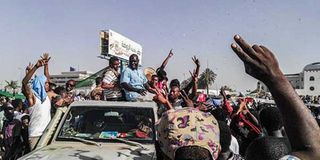Sudan protesters rally for fifth night outside army HQ

Sudanese protesters salute a military armoured vehicle as they gather during a demonstration in front of the military headquarters in the capital Khartoum on April 9, 2019. Thousands of protesters camped outside army headquarters for a fifth night Wednesday demanding President Omar al-Bashir step down PHOTO | AFP
What you need to know:
- Al-Qaeda founder Osama bin Laden lived in Sudan between 1992 and 1996.
- The Sudanese Professionals Association launched the protest movement in December.
- Officials say 49 people have died in protest-related violence since demonstrations first erupted in December.
Khartoum
Thousands of Sudanese protesters camped outside army headquarters for a fifth night Wednesday demanding President Omar al-Bashir step down, as Washington voiced hope after the police ordered forces not to intervene.
In what has become the biggest challenge yet to Bashir's three decades of iron-fisted rule, crowds of demonstrators continued to throng the sprawling complex at night, singing and dancing to the tunes of revolutionary songs, witnesses said.
NIGHT SHIFT
"People are coming in droves," said an onlooker without revealing his name for security reasons.
"Men and women from all corners of Khartoum and other towns are coming for what they call a night shift."
The sprawling complex was lit up in a sea of light as protesters held up their mobile phones as torches.
"I hope our revolution will achieve its goal," said Alaa Salah, dubbed the protest movement's "Nubian queen" after a video clip went viral of her conducting chanting with demonstrators outside the army headquarters.
WIDELY PARTICIPATING
A student of architecture and engineering, Salah told AFP women were "widely participating" in the protests "not only for their rights but for the rights of the entire community".
"If you see Sudan's history, all our queens have led the state. It's part of our heritage."
The Sudanese Professionals Association (SPA) that launched the protest movement in December urged women to continue demonstrating outside the army complex and other military bases.
TEAR GAS
The demonstrators have braved regular volleys of tear gas from members of the powerful National Intelligence and Security Service (NISS) since they began camping at the army headquarters on April 6, protest organisers say.
But for the first time Tuesday night they did not face any "threat" from security agents, said a protester who requested anonymity for security reasons.
That came after 11 people, including six members of the security forces, were killed Tuesday during demonstrations in the capital, government spokesman Hassan Ismail told the official SUNA news agency.
DEATHS
Officials say 49 people have died in protest-related violence since demonstrations first erupted in December.
The United States renewed calls Wednesday for Khartoum to allow peaceful protests.
Tibor Nagy, the US assistant secretary of state for Africa, said he was "heartened" at the relative calm overnight Tuesday.
"We call on the government of Sudan to respect the rights of all Sudanese people to express grievances peacefully," he tweeted.
On Tuesday, the United States, Britain and Norway for the first time threw their weight behind the protesters.
POPULAR DEMANDS
"The time has come for the Sudanese authorities to respond to these popular demands in a serious" way, the countries' Khartoum embassies said in a statement.
"The Sudanese authorities must now respond and deliver a credible plan for this political transition."
Sudan, along with Iran, Syria and North Korea, is on Washington's blacklist of state sponsors of terrorism.
Al-Qaeda founder Osama bin Laden lived in Sudan between 1992 and 1996.
On Tuesday, security agents had to abort bids to disperse the crowds when soldiers countered their volleys of tear gas by firing gunshots in the air, witnesses said.
MONITORING DEMOS
NISS said it was "monitoring the demonstrations and discharging its duty according to law".
"Along with other security forces we have the capability to stop unlawful elements."
Sudan's police has ordered its forces not to intervene against protesters.
"We call on God to preserve the security and calm of our country... and to unite the Sudanese people... for an agreement which would support the peaceful transition of power," it said in a statement.
On Wednesday, protesters were raising funds to ensure a regular supply of food and water for the crowd.
"Many shop owners and businessmen have offered us free supplies," said one demonstrator.
WATCH FOOTBALL
Protesters have set up five big screens at the complex to watch football matches, an onlooker said.
Witnesses said troops stationed vehicles loaded with machine-guns at the gates of the army complex, which also houses Bashir's residence and the defence ministry.
"The soldiers at the complex are also angry after the attacks of tear gas and are determined to prevent them," another demonstrator told AFP.
The SPA said "several members and leaders" of Sudan's paramilitary Rapid Support Force (RSF) had given indications they would join the movement.
The RSF is comprised of Arab militias that fought on the side of government forces against rebels in Sudan's western region of Darfur in the initial years of the regional conflict.
BASHIR'S RALLY
Bashir's ruling National Congress Party said plans to hold a rally backing the president on Thursday had been postponed.
Bashir has remained defiant in the face of protests, which erupted on December 19 in response to a government decision to triple the price of bread.
They quickly mushroomed into a nationwide campaign against his rule with rallies held across cities, towns and villages.
In response, Bashir has imposed a slew of tough measures including a nationwide state of emergency, which has led to scores of journalists and activists being arrested.
The protest organisers have meanwhile appealed to the army for talks on forming a transitional government.





